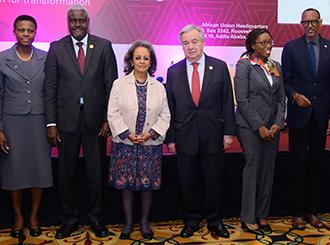
Addis Ababa, Ethiopia, February 8, 2019 (ECA) – United Nations Secretary General, António Guterres, on Saturday issued a clarion call to African leaders to ensure the needs and perspectives of the continent’s women and girls are fully integrated into efforts to build peaceful, just and inclusive societies.
Speaking during a high-level session meeting on gender equality and women’s empowerment in Addis Ababa, Mr. Guterres said although in 1995 African women made their voices heard during the Beijing World Conference on Women, progress still fell short of commitments made.
“Let’s be frank, in Africa, as all over the world, we live in a male dominated world with a male dominated culture - This is essentially a question of power,” he said.
“What I have learned since being a young boy is that power is not usually given. Power must be taken. As it is a question of power, parity in decision-making bodies is absolutely essential,” the Secretary-General added..
Mr. Guterres said he was happy that since the first of January, the UN had for the first time in its history, achieved full gender parity in the high-level management of the organisation.
“This represents a first step for full gender parity in 2028 at all levels of the UN, which remains our basic objectives,” he said, adding this year’s anniversaries of Beijing+25 and of the UN’s resolution 1325 on women “must push us further and faster towards progress on gender equality and women’s empowerment”.
The UN Chief said it was sad that poverty in Africa, as in the rest of the world, still had a woman’s face with violence against women remaining pervasive.
“Although by now we clearly understand the benefits - indeed the imperative - of inclusion and gender equality for achieving peace and sustainable development, our actions fall short,” he said.
Mr. Guterres said the UN stands alongside the African Union in working to overcome the peace and security, development and human rights challenges that continue to limit African women and girl.
“We must facilitate women’s meaningful contributions to the communities they live in. That means enhancing women’s social, economic and financial inclusion. It means providing true protection against violence in conflict and in peacetime, on the streets and in the home,” he added.
Mr. Guterres, who reaffirmed his commitment and support to the African Women Leaders Network initiative, and the African Women Leadership Fund, which was launched today, added making sure women and girls are encouraged to develop scientific skills through access to innovation and technology was also crucial.
For her part, Former Liberian President and African Women Leaders Network (AWLN) Patron, Ellen Johnson Sirleaf, said; “It is time to move from speeches into action as we seek the betterment of the African woman.”
She said financial inclusion was one of the best proposals that seek to address critical barriers limiting women’s contributions to mainstream economic activities.
AUC Chair, Mr. Moussa Faki Mahamat said it was unacceptable that women on the continent continued to bear the brunt of violence and conflict, limiting their contribution to their economies.
“As I speak thousands of women in Libya, South Sudan, Somalia and elsewhere are enduring the unspeakable,” he said, adding Africa cannot build peace without women.
Mr. Mahamat said his administration was doing all it can to ensure there is gender parity in the organization.
For his part, Canada’s Prime Minister, Justin Trudeau, emphasized the importance of empowering women at all levels of society, adding his country will continue helping Africa to move the gender equality fight ahead.
"Men need to be allies in the fight for gender equality. No country can reach its full potential without the full participation of all its citizens. Achieving gender equality therefore must be a priority,” he said.
Norwegian Prime Minister, Erna Solberg, said; “As leaders and policy makers, we must do more to remove the barriers women face in accessing finance, markets, and technology. We must ensure that women have the knowledge, networks and mentoring necessary to start and grow their businesses.”
Ethiopia’s President, Sahle Work Zewde, said although some progress had been made since Beijing, much still remained to be done in the fight for gender equity.
“Gender equality is far from being achieved despite many conferences, resolutions and debates,” she said.
“We have failed our women and girls. We need to go back to the grassroots to address issues facing the marginalized, those who cannot get a seat at the decision-making table; those who are failing to have access into schools and universities.”
South African President, Cyril Ramaphosa, said during his term as chair of the AU, he would focus on women’s financial and economic inclusion; gender-based violence; and accountability to global gender commitments by the continent.
“Heads of States have the power to make catalytic change at national level that will have multiplier or positive ripple effects on the continent,” he said, stressing that to attain women’s financial inclusion and economic empowerment, “we must look beyond micro-finance solutions and invest in solutions that target the full range of constraints that women face in growing their businesses”.
The event, which was held in the context of the AU Summit was organized by the AUC, the Economic Commission for Africa, UN-Women, the AWLN and their partners.
Issued by:
Communications Section
Economic Commission for Africa
PO Box 3001
Addis Ababa
Ethiopia
Tel: +251 11 551 5826
E-mail: eca-info@un.org